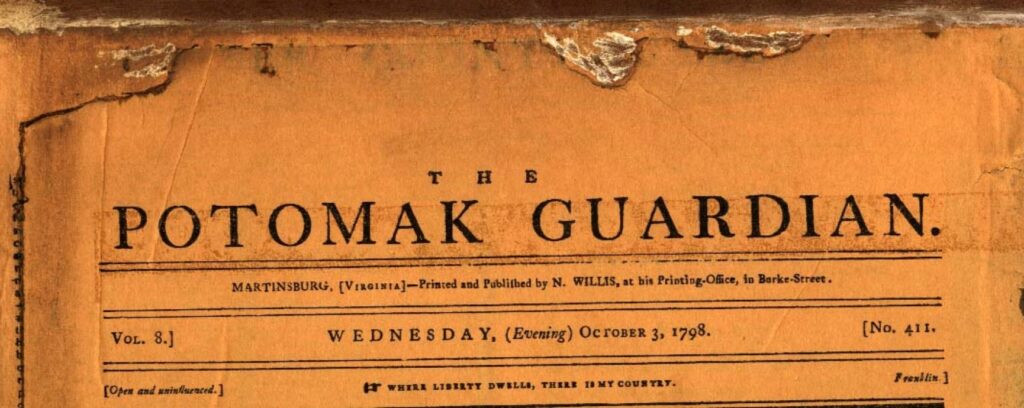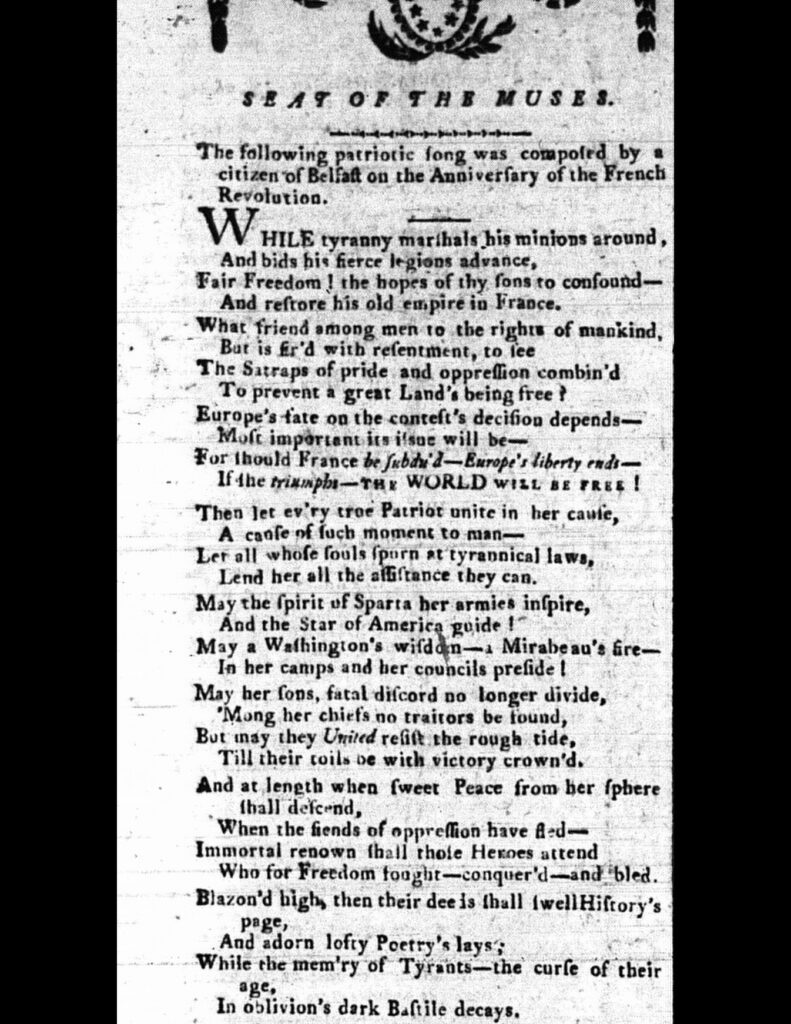Potowmac Guardian and Berkeley Advertiser and Potomak Guardian
Posted by Jane Metters LaBarbara.August 27th, 2021
Blog post by Rachael Barbara Nicholas, WV National Digital Newspaper Project grant assistant, WVRHC
Nathaniel Willis was the first of several great literary men in his family, including his grandson, author and poet, Nathaniel Parker Willis. Willis published the Independent Chronicle and Universal Advertiser in Boston during the American Revolution. He also participated in the Boston Tea Party and served as an adjutant in the Continental Army. Willis sold his interest in the Chronicle in 1784 and relocated to Winchester, Virginia, as the editor of Willis’s Winchester Gazette & Public Advertiser. He moved to Shepherdstown in 1790 and began to print the Potowmac Guardian and Berkeley Advertiser before moving a third time to Martinsburg, where the paper underwent two name changes (the Potomak Guardian and Berkeley Advertiser in 1795 and the Potomak Guardian in 1798). Willis presented his paper as a source of national and international news that curious readers could comment on through letters to the editor. Although the content on the first page varied, the second and third usually contained articles on major events and speeches from significant political figures. The fourth concluded with poetry, titled the “Seat of the Muses,” and a series of advertisements.
The Early Republic was a fruitful era for newspaper content. The Age of Revolutions could be felt in France, Haiti, Greece, and Latin America. Anglo-Americans watched with interest from the United States in the aftermath of their own revolution. The adherents of Jeffersonian Republicanism who patronized the Potowmac Guardian and Berkeley Advertiser scanned its columns for the latest updates from France. They praised the French Revolution and celebrated “the cause of democratic republicanism” in France, drawing comparisons between the French and American Revolutions. The Seat of the Muses published a poem “by a citizen of Belfast” echoing the sentiments of Jefferson’s adherents: “Should France be subdu’d—Europe’s liberty ends/if she triumphs—the WORLD will be free.” So “let ev’ry true Patriot unite in her cause/a cause of such moment to man/let all whose souls spurn at tyrannical laws/lend her all the assistance they can.” Although the poet was presumably writing for an Irish audience, Jeffersonians recognized the call to “spurn at tyrannical laws” as their own.
Willis and his Jeffersonian audience used the press to denounce laws that seemed tyrannical. They had to remain vigilant against tyranny if they wished to maintain their republican identities. The Jay Treaty (1794) and the Alien and Sedition Acts (1798) afforded several opportunities for protesting tyranny and defending political virtue. The Jay Treaty mitigated the threat of war and promoted peaceful trade between Great Britain and United States during the French Revolutionary Wars. Jeffersonians believed the treaty would undercut republicanism at the expense of France, America’s would-be ally, and strengthen aristocracy. More than that, many felt it was a betrayal of France, who was at war with Great Britain. Willis published a letter that he attributed to the Minister of the French Republic, which lambasted America for scorning her friends in France. “Those who went to brave tempests and death upon the ocean, forgot all dangers in order to indulge the hope of visiting that American continent where… the French colours had been displayed in favor of liberty,” the author asserted. “Under the guarantee of the laws of nations… they expected to find in the ports of the United States an asylum as sure as at home.” Instead, they found a British-American alliance. Indignant Jeffersonians sympathized with the French and burned effigies of John Jay in contempt.
The Alien and Sedition Acts impacted Willis personally as a newspaper editor. The Sedition Act criminalized the making of false statements directed at the federal government during the Quasi War, an undeclared naval war with France. Critics of the act argued that Federalists were using the Quasi War to justify the suppression of dissent from Democratic-Republicans. Willis announced his opposition to the Sedition Act when he changed the header of the Potomak Guardian in 1799. The new header read, “Congress shall make no law abridging the freedom of speech, or of the press.” The audience of the Potomak Guardian agreed, sharing their opinions with Willis. A reader calling himself “A True Republican” condemned the publication of “impudent and scandalous falsehoods” and believed Congress could “restrain by law the writing and publishing [of] any thing which tends to prevent the execution of any power vested by the Constitution in the government of the United States.” Those stipulations aside, he could not accept the Alien and Sedition Acts, which he deemed “dreadful.”
Willis remained the editor and publisher until October 30, 1799, when Armstrong Charlton succeeded him, publishing the last known issue of the Potomak Guardian on January 8, 1800. Willis professed his intention to leave Martinsburg on December 4, 1799, and subsequently moved to Chillicothe, Ohio, where he established the Scioto Gazette.








